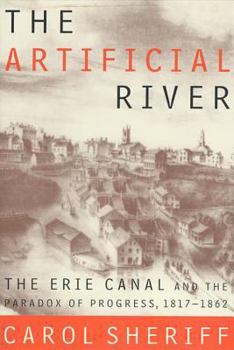The Artificial River: The Erie Canal and the Paradox of Progress, 1817-1862
Select Format
Select Condition 
Book Overview
The story of the Eric Canal is the story of industrial and economic progress between the War of 1812 and the Civil War. The Artificial River reveals the human dimension of the story of the Erie Canal. Carol Sheriff's extensive, innovative archival research shows the varied responses of ordinary people-farmers, businessmen, government officials, tourists, workers-to this major environmental, social, and cultural transformation in the early...
Format:Paperback
Language:English
ISBN:0809016052
ISBN13:9780809016051
Release Date:June 1997
Publisher:Hill & Wang
Length:272 Pages
Weight:0.61 lbs.
Dimensions:0.8" x 5.5" x 8.4"
Customer Reviews
5 ratings
Impressive book about an impressive public work
Published by Thriftbooks.com User , 18 years ago
For too many people, the Erie Canal was simply an artificial waterway that opened the American west (back then) to the Atlantic, and, in the process made New York City a business entrepot. Carol Sheriff, in her book, "The Artificial River: The Erie Canal and the Paradox of Progress, 1817-1862" digs a lot deeper to reveal the complexities of "Clinton's Big Ditch". There were the engineering problems to be surmounted. There were financial considerations. There were the legal knots that plagued the Canal Commission. The relationship--even the definitions--of nature, art and technology became blurred to so many people. But what I came away with the most was the utter chaos and disturbance the building and maintenance of the canal created. This was not a harmonious public work, dug by noble laborers, which enriched the lives and purses of the enitre populace. Instead, as Professor Sheriff demonstrates, there was a great deal of strife between the canal builders and the local residents. The wealth went to the few, and the builders got nothing--not even praise or thanks. This, in turn, created a new class of anonymous laborers which was counterpoint to the ideals of Republicanism. And, as Sheriff points out, DeWitt Clinton would have shook his head in disbelief, had he known this would have happened. As a whole, however, "The Artificial River" reminds us of the tremendous efforts that went into the making of the Erie Canal. And equally impressive, is the tremendous effort Professor Sheriff put into this well-researched and quickly paced book.
Informative, graceful writing
Published by Thriftbooks.com User , 21 years ago
The Artificial River is one of those history books that is not only illuminating, but fun to read. Sheriff writes with an easy grace that takes you along her narrative path, intelligently putting together the pieces that tell the compelling history of the individuals who built, used, and lived near the Erie Canal. But the book raises larger issues to contemplate: the effect of technology on social interaction, and the contradiction that when distances between points are foreshortened, the alienation of individuals locally can increase. In light of the Internet, this is still a pertinent history lesson.
Fascinating Read
Published by Thriftbooks.com User , 21 years ago
This book describes the complicated and fascinating social history of the canal that shrunk time and distance and transformed western New York, brought great wealth to many and opened up the west. But this progress came at a price and the book explores some of the paradoxes of progress. The progress and transformation that the Erie Canal brought also brought a new set of challenges for residents and legislators. The canal split many farms causing great problems to many farmers who wanted bridges to get to their farms, the low bridges were a hazard to canal passengers and traffic. Water diverted for the canal and locks created water shortages though the region. Leaks in the canal caused flooding on some farms and created mosquito infested ponds, which were fertile grounds for malaria epidemics. Cultural issues came to the forefront. Ditch diggers who lived in shantytowns, who drank and cusses, who tore down fences caused consternation among the inhabitants who feared that the county was creating a permanent underclass. When the digging was done and the diggers gone they were replaces with another underclass, the boat drivers, who drank, cussed, robbed and hored making the areas adjoining the canal crime-ridden. This book takes you to the time when the canal was being built and is a joy to read.
An excellent shock
Published by Thriftbooks.com User , 23 years ago
The Artificial River was a shock for me. I'll admit, I had to read this book for a 19th century American history class and I wasn't too happy. I felt something about the Civil War would be more interesting. And how interesting could an artifical river be anyways? Fortunatley, I didn't discard the book, but read it and I was completely shocked. Carol Sheriff has completed an amazing feat. This book about the Erie Canal pulled me into its world giving a tremendous feel of the 19th century world. Sheriff provides a look from all classes of society adjusting to the shifts of progress. This book at its core is just that, a society adjusting to rapid progress - progress that brings its perks and pitfalls.
Fabulous new social history
Published by Thriftbooks.com User , 23 years ago
I had to write in after reading Mr. "Sonysummer's" unfair and ridiculous review of this wonderful book. Perhaps he simply doesn't know a thing about social history (it's a little different from the Harry Potter books he usually reviews), but this is at its finest. Carol Sheriff has given us a well-researched, well-written, insightful account of this critical period of American history. A must-read!





